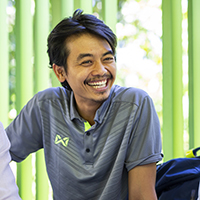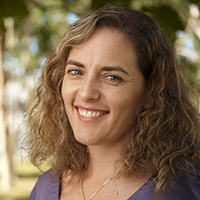Fast Facts
Location
Commencing
- Townsville: January, September
- Cairns: January, September
Fees
$9,240.00+
$35,428.00^
+estimated annual Commonwealth Supported Fee for a full-time study load. Please note this estimate is variable and subject to fluctuation depending on choice of elective subjects.
^estimated annual tuition fee for a full-time study load
Plus Student Services and Amenities fee
Fee deferral and scholarships available if eligible
Currently displaying fees for 2025, which are subject to change in following years.
Duration
1.5 years full-time
Entry Requirements
AQF Level 7 bachelor degree in science with minimum GPA of 5.0; or equivalent
Course Code
106904
Course detail
Learn from research and industry experts and diversify your knowledge studying the unique environments of North Queensland, including coral reefs, seagrass beds, mangroves, dry savannahs and tropical rainforests.
During this flexible, 18-month, full-time course, you will learn from research and industry experts through practical experiences in varied environments. Choose from one of seven majors, with each offering a range of electives and skills-based classes to extend and specialise your core knowledge components.
View the handbook for a detailed overview of available majors and subjects.
Additional information
Master of Science Degree
Are you a curious and innovative person looking to advance a scientific research career in a field of your choice? The Master of Science degree at JCU offers everything you could need, with high-quality teaching, seven different majors and excellent employment outcomes. JCU students gain valuable skills, get access to excellent networking opportunities, and become highly employable. You will gain a thorough understanding of the problems facing natural environments as well as the possible solutions, and develop your practical, analytical and communication skills. Explore the coral reefs, seagrass beds, mangroves, savannahs, and rainforests of North Queensland and enhance your employability with a JCU degree. You will learn from our world-class student resources and hands-on experience, making this degree the perfect basis for a career in a scientific field. Study at the campus in Townsville or Cairns and complete your master’s in 1.5 years full-time or 3 years part-time.
Choose Your Major
The master’s degree of Science at James Cook University offers you the opportunity to choose the field that most aligns with your interests and career goals, allowing you to specialize in what is most relevant to you through seven different majors. These are:
- Aquaculture Science and Technology
- Environmental Earth Science
- Environmental Management
- Fisheries Science and Management
- Geology
- Global Change Biology
- Tropical Biology and Conservation
All of the majors will offer you a solid basis in science and provide you with the key skills you need for your career, but they will focus on the different aspects that most interest you. You can further specialize your degree with the elective subjects that you will be taught alongside the core components.
Learn from the Best
Studying at JCU will offer many opportunities for hands-on work and thorough practical learning. You will learn from world-class lecturers and tutors who are leaders in their fields and offer unrivalled student support and top learning resources. JCU is in the top 100 universities in the world for earth and marine sciences and is #23 in the world for ecology. This means the degree is highly regarded after graduation, but also that you can expect to receive top-quality teaching and student support during your time at JCU. You will always gain a deep and complex understanding of the topics you study and get access to a range of networking opportunities and learning resources to prepare you for the world of science.
Become Employable with a Science Master's Degree in Queensland
JCU graduates always complete their degrees with the skills and knowledge they need to succeed in the field of their choice and are highly employable in a range of different settings. They gain valuable experience and are taught all the skills they need to succeed during their studies. They also complete the Master's Employability Program, a structured co-curricular program that is aimed at employability skills and development. The plan will be tailored to your goals and your course is a unique opportunity to enhance your employability after graduation. Graduates with a master’s degree in Science can expect to find employment in the public or private sector in Australia or abroad, for organisations in government, business, education, research or non-profit.
To study for the top Science master’s degree in Queensland, apply through the online application portal.
Hide additional information
Inherent requirements
Inherent requirements are the identified abilities, attributes, skills, and behaviours that must be demonstrated, during the learning experience, to successfully complete a course. These abilities, attributes, skills, and behaviours preserve the academic integrity of the University’s learning, assessment, and accreditation processes, and where applicable, meet the standards of a profession. For more information please review the inherent requirements for the Master of Science.
Majors
There are 7 majors offered within the Master of Science. Students can also select elective subjects within the same major or from another discipline to enhance their learning.
All majors are available at the Townsville campus. Students attending the Cairns campus must select from the Environmental Earth Science, Environmental Management, Global Change Biology, and Tropical Biology and Conservation majors.
Aquaculture Science and Technology
Students benefit from staff members who are world-leaders in tropical aquaculture research, and a combination of theoretical and hands-on learning in JCU’s Marine and Aquaculture Research Facility, the largest university research aquarium facilities in Australia. You will explore the science behind the innovative and sustainable commercial production of aquatic species.
Gain knowledge and skills on scientific, technological and practical applications of breeding and rearing of aquatic organisms for food, aquarium, pearl and pharmaceutical applications. Through course work with field trips, and unique hands-on Hatchery Technique subject, you will understand how diverse species are farmed and the science and biotechnology approaches to enhance production including physiology, nutrition, genetic selection and disease management.
Our researchers’ strong links to industry will give you a sound professional network and a wide range of career opportunities when you graduate.
Environmental Earth Science
Learn about the impacts of land use, land management, and climate change on the Earth’s surface, about present and future environmental challenges facing modern society, and how applied science is helping to solve these problems.
Gain specialised skills in assessing land and water condition and apply your learnings to the diverse environments of the tropics, including tropical rainforests, fertile agricultural regions, the vast savannah outback, magnificent tropical rivers, diverse coastlines, and various other field areas in North Queensland, Australia and beyond.
Environmental Management
Reap the benefits of hands-on fieldwork experience to develop your capability in natural resource management. Work with research and industry experts to deepen your understanding of how natural environments function and change over time and how to manage them.
Gain specialised technical skills in remote sensing, Geographic Information Systems, and Environmental and Social Impact Assessment. Become an expert in the interconnected ecological and social aspects of managing complex ecosystems.
Fisheries Science and Management
Explore the fundamentals of fisheries science and its application in tropical environments. Gain knowledge, technical skills and experience in fisheries assessments, sustainable development and management approaches.
Tackle the grand challenges in fisheries across small scale and industrial contexts, to ensure the best possible outcomes for human communities, fish stocks, and ecosystems globally.
Geology
Develop your knowledge of geological structures, mineralogy, plate tectonics and geochemistry, as well as the field, instrumental and analytical techniques used to conduct research in these areas. Benefit from practical experience studying minerals, rocks and sediments—and their chemical make-up—in research contexts including the Great Artesian Basin, the Outback, the Great Barrier Reef Marine Park, and other coastal and terrestrial environments.
Learn about feasible and sustainable ways to explore for and extract strategic/critical resources and evaluate geological natural hazards that may threaten communities.
Global Change Biology
Develop the technical skills and knowledge necessary for environmental conservation, research and analysis in a rapidly changing world.
Gain in-depth knowledge of global changes, patterns of biodiversity, conservation planning and evolutionary adaptation and be equipped to address the threats and challenges to global biodiversity. Learn how to identify major issues impacting species and ecosystems, analyse the contributing factors and formulate methods of solving some of our world's biggest problems.
With the natural environment changing at an unprecedented rate, it has never been more important to understand and reduce the accelerating impacts on our ecosystems.
Tropical Biology and Conservation
Benefit from access to natural environments in close proximity to JCU campuses, including savannahs, the World Heritage Daintree Rainforest, and coastal marine habitats. Your studies will integrate a range of disciplines such as zoology, ecology, botany, and behaviour and evolution biology across an array terrestrial and marine habitats.
Observe, explore and build your understanding of the diversity of the biological world while developing the skills necessary to conduct applied research and / or work in environmental science industries delivering innovative and sustainable solutions for conserving the natural environment.
View the handbook and for detailed subject information.
Advance your scientific career with a professional post-graduate course. JCU Master of Science graduates are highly regarded and find employment in a range of organisations within Australia and around the world.
You could pursue your specialised scientific field in the public or private sector, working for business, government, educational, research or not-for-profit agencies.
As a Master of Science graduate, you may find yourself holding positions such as a biologist, ecologist, conservation agent, environmental manager or specialist, or within academia as a researcher or teacher within these fields.
Estimated annual Commonwealth Supported fee: $AUD9,240.00
Estimated annual tuition fee: $AUD35,428.00
A variety of Scholarships are available to suit different student types.
Complete an online application through our Online Application Portal.
Real stories
-

Student
Sheila Villora
Master of Science, majoring in Fisheries Science and Management
JCU is one of the world’s leading universities in Marine Science and offers study on Fisheries Management in the Tropics. This was the main reason I travelled from Germany to study here in Townsville. I had the opportunity to work on projects which will help to conserve the marine environment on an international scale.
-

International Student - Thailand
Nut Munpholsri
Master of Science, majoring in Tropical Biology and Conservation
I was looking for opportunities to study and conduct research in a thriving environment. JCU location provides a great opportunity for my field. My aim is to acquire research skills, build up international networks, and return to Thailand to join a research team.
-

Lecturer
Dr Naomi Gardiner
Senior Lecturer, Marine & Aquaculture Sciences
The best part of working at JCU is being part of an incredibly vibrant, active and diverse team of students and staff. Together our JCU Science team regularly makes breakthrough discoveries that change paradigms and practices globally. It is great to be able to contribute to work that really does make a difference.